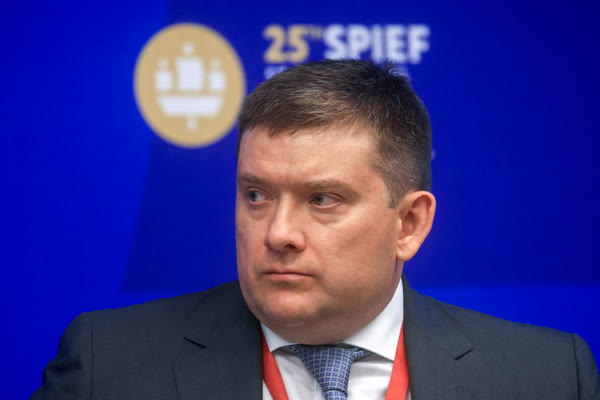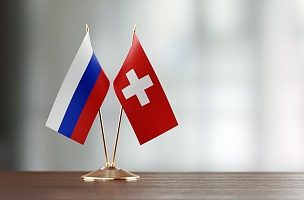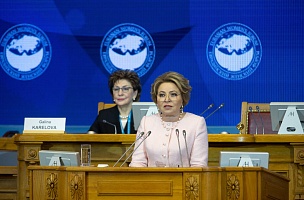Key conclusions
Thanks to joint efforts and quick decision-making, sanctions have not led to a downturn in SMEs
“Unprecedented sanctions have been imposed on our country, and the fact that business, government, and society all come together as they did, and unprecedented measures were taken for business in the financial sphere, in relation to taxes, in the consumer market, in administrative responsibility, in foreign economic activity, in the procurement system – it all meant we avoided a great recession, at least in small business. Sometimes laws were passed in four days, and a special thanks go to the government for that, and of course, to members of the State Duma and the Federation Council,” Alexander Kalinin, President, All-Russian Non-Governmental Organization of Small and Medium-Sized Businesses OPORA RUSSIA.
“What we’ve got is an average check for small businesses, if we compare the beginning of February with the beginning of June, that has increased by 12%. Yes, we understand that this correlates roughly with inflation, which is now estimated at 17% annually, but even so, it means that the kind of recession that some economists, especially in unfriendly countries, were counting on and forecasting did not happen. The key is constant feedback, courage in decision-making, and a willingness to work together as a team with the authorities, development institutes, legislators and, of course, business associations,” Alexander Kalinin, President, All-Russian Non-Governmental Organization of Small and Medium-Sized Businesses OPORA RUSSIA.
PROBLEMS
Regional fragmentation
“I would like to draw your attention to the fact that... the government’s task is to make sure that support measures for small businesses, and indeed for all industries, for large ones too, are comparable in every region. At least comparable, if not identical. Because the situation here is as follows: at the federal level we have adopted a measure of support for systemic enterprises, for small businesses. Yes, it is very important. Then the wealthier regions provide their additional subsidies, their support measures for their own regional enterprises. Yes, it’s a very good thing, but what about the regions that can’t afford it because of budget constraints? Once again, it’s the regions that can afford to support their enterprises that develop,” Nikolai Zhuravlev, Deputy Chairman of the Federation Council of the Federal Assembly of the Russian Federation.
“We talk about industry in terms of supporting projects, but the hardest part is finding those projects, structuring them, and providing them with financial leverage,” Aleksandr Isayevich, General Director – Chairman of the Management Board, Russian Small and Medium Business Corporation.
“Many inspections, given that people need something to keep them busy, have gone to the budgetary sector. Neither is it easy for budgetary employees, budgetary enterprises, so it has to be controlled at the regional level, so that supervising and verifications don’t spread to other sectors that don’t deserve to be checked from morning till night now too. The same work as the federal moratorium on inspections, of course, should be carried out by the governors, too, within the scope of their powers,” Nikolai Zhuravlev, Deputy Chairman of the Federation Council of the Federal Assembly of the Russian Federation.
A lack of coordination by sectoral ministries and state corporations
“One other thing I’ll say is that it worries me the way state corporations are now settling accounts with small businesses. The government says one thing, it sets an advance of 50%, sets settlement targets – and nothing’s done for months at a time. And all the while, they keep the money on deposit in expensive banks. We’re creating a crisis out of nowhere all by ourselves,” Alexander Kalinin, President, All-Russian Non-Governmental Organization of Small and Medium-Sized Businesses OPORA RUSSIA.
SOLUTIONS
Engaging sectoral ministries and removing administrative barriers
“We need to employ the regulatory framework that was created in 2008 to include sectoral ministries in the prioritization of small business development in their sectors, so they can start the appropriate programmes or at least get an understanding of what to start. For example, what does the Ministry of Transport consider a priority for small business development in transport, in logistics, which is now one of the most pressing issues in small business?” Alexander Kalinin, President, All-Russian Non-Governmental Organization of Small and Medium-Sized Businesses OPORA RUSSIA.
“[We must] expand fiscal regimes and revise the system of electricity tariff differentiation for small businesses. We also need to continue to work on removing barriers, on pressures, to continue the education programme. We believe that by joining forces, we can achieve employment in small businesses that isn’t 30% – we can reach the threshold of 40%,” Alexander Kalinin, President, All-Russian Non-Governmental Organization of Small and Medium-Sized Businesses OPORA RUSSIA.
Expanding support measures for entrepreneurship
“Given the way risks in the economy continue to grow, for obvious reasons, the rates to cover the risks also continue to grow, and it seems to us that state support subsidies through lending programmes should be expanded to include new types – mezzanine lending, crowdfunding, and so on,” Nikolai Zhuravlev, Deputy Chairman of the Federation Council of the Federal Assembly of the Russian Federation.
“Let’s expand concentrated support within national projects and within state programmes like, for example, for agriculture,” Alexander Kalinin, President, All-Russian Non-Governmental Organization of Small and Medium-Sized Businesses OPORA RUSSIA.
“We need to think about tax revenue from small and medium-sized businesses and not just about what benefits to hand out. It means that we have to create the conditions for businesses to sustainably fill the gap that will arise year by year in budget revenues as a result of the processes at play in the world,” Yaroslav Kuzminov, Academic Supervisor, National Research University Higher School of Economics; Coordinator of the Expert Council of the Government of the Russian Federation.
Regional support
“We believe regional industrial development foundations to be a very important and effective mechanism. There’s the preferential rate and a fairly wide range of industries there, and it seems to me that this programme is worth developing,” Nikolai Zhuravlev, Deputy Chairman of the Federation Council of the Federal Assembly of the Russian Federation.
“First, for all the entrepreneurs working on the simplified taxation system and planning to move to work in Udmurtia, [a preferential tax rate of] 1% for three years has been established. That’s important. And the second thing is the head team, the Udmurtia team – we’re a service team. We’ve been studying for five years, and I think we’ve finally learned how be real servants and not officials,” Alexander Brechalov, Head of the Udmurt Republic.
Read more in the Roscongress Foundation Information and Analytical System roscongress.org






